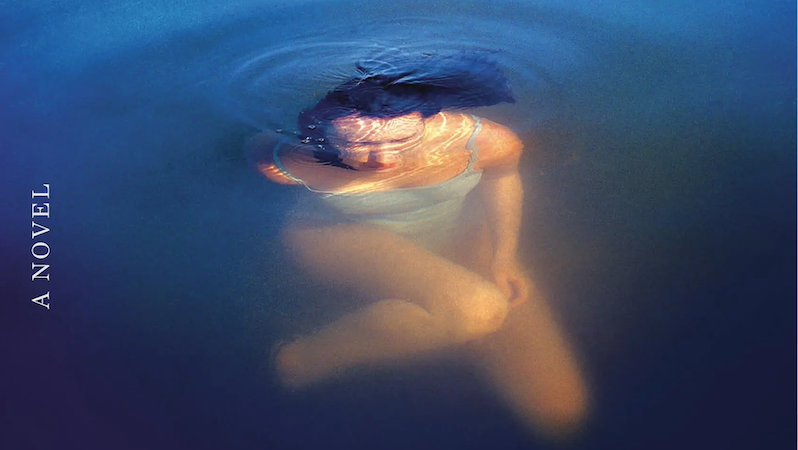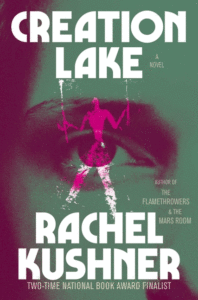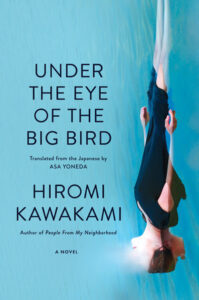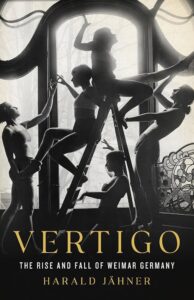
Our fivesome of fantastic reviews this week includes Lily Meyer on Rachel Kushner’s Creation Lake, Kristen Millares Young on Chelsea Bieker’s Madwoman, Hillary Leichter on Hiromi Kawakami’s Under the Eye of the Big Bird, Colm Tóibín on Mark O’Connell’s A Thread of Violence, and Thomas Meaney on Harald Jähner’s Vertigo.

“Kushner often loans her protagonists her own biker swagger, the hard layer of confidence that helps a woman survive in a very male environment. Preferring to write in the first person, she also gives her central characters her distinctive style: Kushner is alternately warm and caustic, funny and slippery, able to swing from high-literary registers to street slang and back in an instant. Her recurring theme has been the limits that even groups of outsiders impose on women, and yet her female characters, no matter how constrained they find themselves, are roving, curious thinkers, using their keen powers of observation to escape subjugation and victimhood—in their minds, if not in their circumstances … Kushner has grown more interested in the push-pull between material restriction and psychic freedom … Not a conventional spy novel, but, unlike Kushner’s shaggy earlier books, it often feels as tight as a thriller … The novel doesn’t become digressive and loose like its predecessors, but it certainly stops feeling like a thriller. After many chapters that seemed to build to a dramatic act of sabotage, the story shifts register, heading into a very different, more emotional denouement. Relinquishing some swagger, Kushner opens up in her writing to new levels of feeling and possibilities for change … Sadie’s swerve suggests that Kushner is ready for big change.”
–Lily Meyer on Rachel Kushner’s Creation Lake (The Atlantic)
“The novel is her chance to directly address a mother who failed Clove so completely that she has been living as an orphan in a fabricated reality. Of this kind of daughterly obsession, Virginia Woolf wrote, ‘For we think back through our mothers if we are women.’ Bieker has spoken and written about being haunted by a mother who circled the drain of an angry man. Forged in violence, the men in her fiction are black holes who threaten to extinguish the light of any woman or child unlucky enough to get near them. One bright flare before being consumed. After that, it’s black eyes and broken bones, shoddy excuses and shattered lives … Bieker explores the nexus between patriarchal control, environmental contamination and women’s bodies, here found in Clove’s focus on corporeal purity as a rejection of her chaotic past … Slick packages can still deliver real substance. In Madwoman, Bieker orbits her literary obsession with the thwarted longing of women denied self-actualization by the societies we bring into being … A thoroughly modern addition to feminist fiction about mental illness and motherhood … As the cadence of the book quickens from commonplace to catastrophic, Clove goes off the rails in a spectacular series of bad decisions that make no sense except within the frenetic constraints of her desperation.”
–Kristen Millares Young on Chelsea Bieker’s Madwoman (The Washington Post)

“People are produced in factories. Communities exist in isolation, spread out from one another by design. Children are raised by groups of mothers, a network of caretakers who may not be altogether human. One narrator seems closer to vegetable than animal. A man can project his mind onto the brain of a bird, but the technology for space travel is long lost. Earth is a place of dread, and humanity might be done for. The problem, summarized by one character: ‘how to preserve even a slim chance that we might someday thrive on this planet again.’ This is the world of Hiromi Kawakami’s haunting latest, Under the Eye of the Big Bird, a novel of connected vignettes all set in a terrible far future. But I started to think of it more as an assemblage of narrative Punnett squares, the details and characters of each section receding or recurring, vying for the dominant plot. It’s less experimental fiction and more fiction on the human experiment—what kinds of new approaches to mating, community and family will allow people to survive? It’s not quite correct to call all the characters ‘people,’ and that’s part of the point. To continue living, this book suggests, people might need to become something else … Kawakami’s prose is often clinically deadpan, but she also finds humor and warmth in the puzzles of existence and extinction … In Kawakami’s soupy chronology, neither evolution nor extinction is linear. We might become what we’ve already been, and we might have already been what we can’t imagine becoming.”
–Hillary Leichter on Hiromi Kawakami’s Under the Eye of the Big Bird (The New York Times Book Review)

“O’Connell’s book has something in common with Marlow’s search for the truth in Joseph Conrad’s Lord Jim…In Lord Jim Marlow may search for meaning, but it is the gaps in the narrative, the prevarications and hesitations, that interest him most. In a way, he is seeking to establish a set of principles to apply or a set of proper questions to ask or a theory of behavior under pressure to formulate. And he seems almost comforted by his failure to do any of those things. O’Connell also seems almost relieved when it is all beyond him … Macarthur, under the terms of his parole, could not speak too freely. But he does, nonetheless, talk: we hear a version of his childhood and his early life, as we hear about his bookishness and his intellectual curiosity. But he hesitates each time O’Connell raises the subject of the murders. He circles and evades, changes the subject. He speaks of himself with an intense self-regard, as though he were known and sought out for his thoughts on ethics and logic and pure reason, rather than for having committed two horrible senseless crimes. O’Connell does not push Macarthur toward some pure and simple-minded self-revelation. Rather than seeking to confront him or accuse him, he studies him, he listens. He is always ready not to be enlightened … He is careful, however, not to make anything up. Instead, he confronts the fact, in all its ironies, that Malcolm Macarthur has both disappointed him and given him his subject: ‘In failing to confront the awful enormity of his sins—in failing to be annihilated by it—Macarthur had failed me as a character. He had denied me the satisfaction of an ending.’”
–Colm Tóibín on Mark O’Connell’s A Thread of Violence (The New York Review of Books)

“For nearly a century, the Weimar Republic has served as the West’s compact mirror, pundits compulsively checking it for ominous signs of resemblance. Is society more polarized? Is the press increasingly in the hands of bombastic billionaires? Do monopolists seem eager to work with demagogues to protect their interests? Are new technologies threatening to make the world unrecognizable? Weimar Germany, those 14 fateful years between the Kaiserreich’s defeat in World War I and Hitler’s ascent to power, has something for everyone, a bountiful supply of déjà vu and I-told-you-so. Our public life is rife with professional apocalypticians ready to lay out the doomsday parallels and declare that we are living in 1929 or 1931 or 1933. As with the poster that popped up on billboards around interwar Berlin commanding ‘Pause, Berlin! Reflect. Your dance partner is death,’ there’s an element of maximal stakes in the macabre cris de coeur … For the most part, he is admirably restrained about drawing neat historical lessons. But the trouble with writing about Weimar, as the German philosopher Peter Sloterdijk once noted, is that it ‘stands before us as the most self-aware epoch of history.’ There are few things left to be said about the Germans in this period that they were not already thinking themselves—often on a more elevated, interesting plane than their epigones. At times it can seem as if everyone in the country were keeping a febrile diary and cogitating in grand essays about the crisis unfolding around them … But if Jähner makes some piquant additions to the cultural lore of Weimar, his political history is more dubious. His book is a softly delivered defense of the ‘thankless reputation’ of the Social Democratic leader Friedrich Ebert, who led the republic for six years after Germany’s loss in World War I…Ebert himself saw stability in moving toward the conservatives and crushing critics to his left. Along with his bloodthirsty defense minister Gustav Noske, he oversaw the massacre of workers protesting his government’s compromises with the right…For Jähner, however, the greater crime was committed by the communists, who refused to get with the government’s program … a book about Weimar should tell us less about ourselves than about German consciousness on the other side of 1933. The period is so encrusted in caricature that it requires a harder hammer to expose what stumbling through modern life for the first time felt like.”
–Thomas Meaney on Harald Jähner’s Vertigo: The Rise and Fall of Weimar Germany (The New York Times Book Review)
If you buy books linked on our site, Lit Hub may earn a commission from Bookshop.org, whose fees support independent bookstores.

